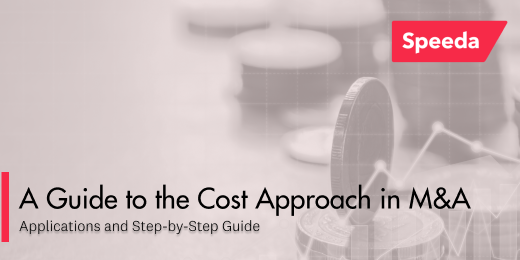Resource Center
Guide | Precedent Transaction Analysis

Summary
Understanding past deals can be key to accurate valuations in today’s market. Precedent Transaction Analysis offers a robust method to ensure your business valuation is both realistic and grounded. By examining similar past transactions, the approach provides valuable benchmarks that are essential for negotiations and strategic decisions.
How Past Deals Can Keep Your Valuation Grounded
What is Precedent Transaction Analysis?
Precedent Transaction Analysis is a method used in finance and valuation for determining the value of a company. It is particularly relevant in the context of mergers and acquisitions (M&As). This approach involves analysing the terms and prices of past transactions that are comparable to the transaction under consideration.
By analysing and benchmarking sales of similar businesses, it provides a groundwork for the range of valuation and relevant metrics a company in that industry should be at if they were to be valued. The analysis offers insights that are both actionable and empirical, beyond the numbers from their own company’s financial statements. This not only aids one in understanding a company’s place in the market but also prepares them for more informed negotiations.
Quick Guide on How to Do Precedent Transaction Analysis
1. Identifying Comparable Transactions
- Industry relevance: Ensure the M&A transactions are from the same or similar industries. Additionally, try to analyse previous deals with companies of a similar size and market footprint.
- The recent, the better: Focus on recent transactions to reflect current market conditions. A deal from 10-20 years ago from the same industry can have vastly different dynamics, especially in fast-shifting industries.
- Purpose of the transaction: Delve deeper into why the transactions were initiated—whether for strategic growth, geographical expansion, or technology acquisition. Understanding the motive behind a deal provides insights into the perceived value and potential synergies that could influence similar future transactions.
- Market condition: Highlight the importance of considering the phase of the business cycle within the sector. For instance, transactions during a growth phase may command higher premiums compared to those during a contraction phase.
- Role of financial sponsors: Discuss how the presence of financial sponsors, such as private equity (PE) firms, can influence deal terms and valuations. These entities often look for specific exit strategies that could affect the transaction’s structure and value.
2. Analysis of the Peer Group
- Business overview: Understand business characteristics such as product/service mix, customer demographics, and geographical presence.
- Financial metrics: Evaluate the companies in previous M&A deals based on their key financial ratios such as enterprise value/EBITDA, P/E ratios, revenue, profitability, growth, and more.
- Innovation and Regulatory Changes: Analyse how technological advancements and changes in regulations could impact valuations within the peer group. For example, a new regulatory framework could increase compliance costs, affecting profitability and, consequently, valuation metrics.
3. Adjusting for Comparability:
- Financial normalisation: Adjust the financial figures from comparable transactions to account for any extraordinary items or one-off events.
- Market condition alignment: Stress the importance of aligning historical data with current market conditions. This includes adjusting for macroeconomic factors, industry-specific cycles, and market sentiment, which are crucial for maintaining the relevance of the comparative analysis.
- Transaction costs and dynamics: Introduce considerations around the financial burden of the transactions, including legal, accounting, and integration costs, which can significantly impact the net value and the structure of a deal.
4. Integrating with Other Valuation Methods:
- DCF and comparable company analyses: Emphasise the need to corroborate findings from the Precedent Transaction Analysis with Discounted Cash Flow (DCF) models and Comparable Company Analysis, providing a triangulated view that enhances valuation accuracy.
- Synergies analysis: Explore how the valuation can be adjusted based on the potential synergies that might be realised post-transaction. This involves estimating cost savings and potential revenue growth from merging operations or cross-selling opportunities.
Pros and Cons of Precedent Transaction Analysis
<PROS>
- Market-driven valuations: Provides a realistic estimate of what the market is willing to pay, based on actual transactions. This reflects the current state of the market, offering a valuation that is grounded.
- Empirical data utilisation: Utilises real-world data, enhancing the reliability and defensibility of the valuation. This approach leverages the relativity concept, allowing you to benchmark your company against recent, comparable transactions.
- Simplicity and objectivity: The method is straightforward and easy to understand as it looks at actual sale prices and not complex projections. It produces a more realistic valuation by relying on real market data, which limits subjectivity and bias.
- Flexibility and relevance: Useful for both small, privately held businesses and larger companies. The approach accounts for a company’s unique attributes such as industry, location, and size, providing a credible range of value.
<CONS>
- Scarcity of data: The availability of suitable comparable data is often limited, which can restrict the applicability of this method, especially in niche industries or for unique business models.
- Time-sensitivity: The relevance of the data can quickly become outdated if market conditions shift. There can be a significant time lag between the precedent transactions and the valuation date, necessitating timely adjustments.
- Adjustment biases and complexity: The need for subjective adjustments can skew the valuation, potentially leading to inaccurate results. Adjustments involve a high degree of judgment and uncertainty, which can complicate the valuation process.
- Incomparability and inconsistency: No two companies or deals are identical. Differences in growth rates, profitability, regions, and product mixes within the same industry make true apples-to-apples comparisons difficult.
- Influence of strategic synergies: Acquirers often incorporate strategic synergies and benefits into their valuations that extend beyond pure financial metrics. This can inflate the multiples from precedent deals, potentially skewing the analysis.
How Database Platforms Can Help with the Pain Points of Precedent Transaction
Database platforms, equipped with comprehensive business intelligence capabilities, are well-suited to address key challenges in Precedent Transaction Analysis, particularly in areas such as data scarcity, time-sensitivity, incomparability, and the influence of strategic synergies.
Scarcity of Data: Database platforms can offer robust solutions to data scarcity by providing extensive access to millions of company data worldwide, with some having expertise in different regions such as Southeast Asia, the US, Europe, or else. These platforms often include detailed information on private companies, mergers and acquisitions (M&A), and market data, which can be invaluable for finding comparable transactions even in niche industries.
Time-Sensitivity: Database platforms address time-sensitivity by regularly updating their databases and providing the latest market news, statistics, and trends. This ensures that users have access to the most current information, allowing for accurate and timely analysis. The ability to provide key updates is crucial for maintaining the relevance of the data used in valuation models.
Incomparability and Inconsistency: No two companies or deals are identical, making apples-to-apples comparisons challenging. Database platforms help overcome this by offering detailed company profiles that include comprehensive financials, business activities, and operational data. This allows users to perform more nuanced and precise adjustments when comparing companies, considering factors such as growth rates, profitability, regional presence, and product mix. Advanced analytics tools on these platforms can aid in identifying and quantifying the differences between companies, facilitating more accurate benchmarking.
Influence of Strategic Synergies: Often, acquirers incorporate strategic synergies and benefits into their valuations, which can inflate the multiples from precedent deals and potentially skew the analysis. Database platforms that provide in-depth industry reports and market analysis that can help users understand the broader strategic contexts of transactions.
This insight makes it easier to discern when a deal’s valuation may have been influenced by synergies, allowing users to adjust their analyses accordingly. Moreover, coverage of strategic developments, partnerships, and industry shifts offers a clearer view of how synergies might affect future valuations.



























